#japanese free reading resources
Text
Japanese Reading Resources for Absolute Beginners
A question I encounter often is "How much Japanese should I study before I can begin reading in Japanese?"
From my experience as a learner and reader myself and from managing a Japanese book club for other learners I can honestly say that you can start way earlier than you probably think!
There are many resources that only require knowing hiragana. Those texts usually teach vocabulary through pictures and only use basic grammar.
Some are even simpler than that: The Japan Foundation's Hiragana Books are great for those, who are still remembering hiragana characters. Every short book introduces only 1-2 new characters, so it's a great reading exercise for those who've just started.

The free graded reader 「どうぞ、どうも」 by the NPO Tagengo Tadoku only uses the words 「どうぞ」 and 「どうも」 to write an entire story. Again, this makes for a great exercise in reading hiragana and understanding context. Another "level 0" recommendation by the same NPO would definitely be 「しろい?くろい?」. This book uses the full range of hiragana characters but the grammar is simple and all used vocabulary is illustrated.
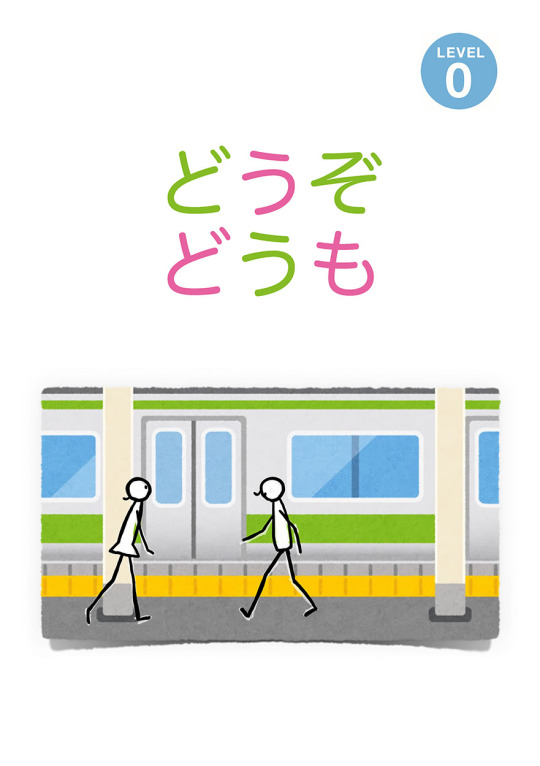

Another site with great resources for absolute beginners is Nihongo Tadoku Dōjō. If you have memorized both hiragana and katakana and know how the particles を and で work you will be able to read this text about stationary (ぶんぼうぐ) and understand everything by looking at the pictures!

The resources linked so far can all be accessed completely free on the linked websites. If you have the money to spare, please also have a look at the box 「スタート」 from the series reberubetsu nihongo tadoku raiburarī published by the NPO Tagengo Tadoku and ASK (affiliate link). This box includes 8 little books in very simple Japanese.

All these texts for absolute beginners will get you started reading in Japanese with very little knowledge of characters and vocabulary.
Reading in Japanese is a skill that requires practice. But once you get used to it, it can be such a valuable tool to reinforce new vocabulary and grammar. So please don't wait until you're "ready" before you start reading - start early at your own level!
#my book reviews#reading in japanese#study japanese#learning japanese#日本語#japanese books#やさしい日本語#free graded readers#free tadoku graded readers#nihongo tadoku dōjō#absolute beginner level#japanese langblr#japanese language#japanese reading comprehension#japanese free reading resources#japanese reading resources
647 notes
·
View notes
Text
Manga you can read for free via Amazon: an informative thread
Facebook
Pinterest
X
On Amazon Japan, there is a number of manga that can be read for free!
Genre options Degrees of freeCan I read a whole series for free?What manga can I read?7th Time Loop: The Villainess Enjoys A Carefree Life Married To Her Worst EnemyHito Kui Shounen to Furerarenai Shoujo
They can be found by clicking this link. Or, by visiting the Amazon Japan kindle store, and…

View On WordPress
#amazon japan#amazon manga#Book Review#fliptoons#free manga on amazon#Japan#japanese learning#japanese manga#japanese resource#language learning#learn japanese#manga#manga recommendation#manga review#manga to read#what is fliptoons#where to read free manga#where to read manga for free
0 notes
Text
If you're upset about duolingo firing it's translators, you should check whatever the equivalent to the BBC is for your target language (or the BBC if that language is English, but if your target language is English and you're reading this I think you're good) because a lot of major national news organizations have resources for learning their language. For example, DW has resources to learn German, NHK has resources for learning Japanese, TV5monde has resources for learning French. They're usually free (or at least, I haven't encountered one that's paid yet) and usually pretty comprehensive (though like with all language learning apps/websites def supplement it with other resources)
2K notes
·
View notes
Text
いろどり · irodori - Japanese for life in Japan
(。•̀ᴗ-)✧ resources

IRODORI is a useful website made by The Japan Foundation. It is a series of 3 textbooks, with audios and materials completely free, focusing on developing skills useful for life in Japan.
Whether you are planning to come to Japan in the future and want to learn what you should be able to do before you arrive, or whether you are already living in Japan and wish to check your Japanese ability and increase the number of things you can do, we sincerely hope that this textbook will help you achieve your goals. - "what is irodori" website page.
The textbooks are super organized, divided in: starter (A1), elementary 1 and elementary 2. Finishing elementary 2 means having an A2 level [At A2 level, you can hold short, basic everyday conversations on familiar topics.]
I recommend styling your learning method with the goal you have in mind. You can understand more about it reading the post I made.
Hope it was helpful! Let me know and let's share resources~
またね~@inkichan
꒰ა ˚₊ ✧・┈・╴﹕꒰ ᐢ。- ༝ -。ᐢ ꒱﹕╴・┈・𐑺 ‧₊˚໒꒱
#japanese#nihongo#studyblr#japanese langblr#langblog#japanese studyblr#日本語#resources#japanese resources#free resources#japanese free resources#textbook#free#free textbooks#pdf#japanese pdf#learn japanese#learning japanese
570 notes
·
View notes
Text
The thing is, the Western superpowers NEED the people divided. Division leads war, displacement, economic collapse, forced assimilation— repercussions that generate income for the overarching hegemony. Division is their backbone. This is why any act of unity in history has been retroactively distorted to brainwash us into thinking there is no alternative to Capitalism. The United States attempted to physically divide Vietnam in the US attempted- intervention on Vietnam, and successfully divided Korea shortly after the nation’s liberation from brutal Japanese occupation.
You can read about the ongoing Korean War here, and see a timeline here.
North Korea has been systematically demonised for being one of the few successful modern Socialist states; for the crime of liberation. They are a demonstration of what anti-Capitalism looks like, and yet we are barred from witnessing that with our own eyes. The Western propaganda machine works at maximum capacity to ensure the masses are deluded into believing North Korea is an evil, oppressive regime, a corrupt government that abuses and oppresses its people— whilst homelessness is at an all time high in the United States and Western nations, with an extortionate cost of living, inaccessible health care and rampant medical negligence, Not to mention, police brutality, Neo-Nazism (like, Western-funded Ukraine’s historic complicity with Nazism) anti-Trans laws that lead to murders of Trans people, and the Western Israeli Regime’s support in multiple genocides across the globe (Mayan, Tamil, Rwanda and of course, Palestine). Not to mention, North Korea has had unwavering support for Palestine
The West has been lying to us for years about China, North Korea, Cuba, Vietnam, Palestine, Iran and so many more nations to mask their deadly Imperial ambitions, money-hungry forceful acquisition of oil and resources, and further imposition of globalised White Supremacy. We, the people, suffer at the hands of our very nations that copiously delude us into thinking there’s no way out, there’s no alternative, there’s no hope.
We implore you learn more about North Korea, and will be adding more resources to our Drive, linked in our link tree. Here’s some more resources on Korea:
Nodutdol 노둣돌 is an excellent pro-Palestinian organisation of diasporic Koreans organising for a world free of Imperialism, and for the reunification of Korea. Check out their page, and website, to keep up to date on their events, organising and get more information on what the West try to hide.
We also recommend this excellent documentary:
youtube
#korea#north korea#western propaganda#anti imperialism#anti capitalism#anti west#free palestine#palestine#jumblr#israel#resources#north korea has never been the enemy#korean unification now#Youtube#dprk
313 notes
·
View notes
Note
If it’s alright, I have a question about Vil and Epel’s relationship. I understand that the accent changing plot line is just a cultural politeness thing that didn’t carry over outside of Japan, but the other parts of changing Epel’s behavior don’t quite make sense.
Why exactly is Epel being forced to call macarons his favorite food? And act very soft-spoken? I can’t see how these fit in with the politeness aspect of the table manners, no abrasive language, etc. It just doesn’t give a very good impression, especially in combination with the unfortunate implication of giving Epel a Southern accent for the “change your accent” plot point.


Before I get to responding to the questions posed by this ask, allow me to explain for those who may not be familiar with this controversy! This is so we can all go into reading this post from the same starting point.
I've made titles to denote the explanation of background knowledge and to denote responding to the questions actually asked to me! If you're already familiar with the Vil-Epel-accent debacle then feel free to skip the first section!
Disclaimer: I’m speaking on these concepts as I personally understand them. However, I am not a native Japanese speaker so I’d advise that you consult additional resources with a better understanding of the language and culture. Two resources I enjoy are Yuurei and MysteryShopTLs, who have both also addressed Epel’s accent and how it was localized.
The Accent, EN vs JP
It’s well-known that Epel is a character with a heavy accent who has been explicitly told by Vil, his dorm leader, to alter the way he speaks. In EN, Epel speaks with what appears to be a southern (as in, “from the southern United States”) accent. Therefore, when Vil tells him to stop speaking in the accent, it feels as though Vil is shaming him for his southern roots and culture. This has also led to fans (especially of the EN-only sphere) thinking that Vil believes Epel’s accent is “unrefined” and “makes him sound uncouth/uneducated”, which is why Vil tells Epel to cover it up. I have even received asks conveying as much in the past (here is one example).
In the original JP, Epel speaks in a way that does not closely resemble any real-world Japanese dialect but rather a blend of them. If you ask a native Japanese speaker, they would likely tell you that it is difficult to understand what Epel is saying and that it sounds as though he is speaking rudely or too casually. People could genuinely take offense to the accent because it can be mistaken as something else entirely. This is obviously very different than the real-world accent (which many people can still understand and wouldn’t perceive as rude) that Epel was localized to have. The decision to give him a southern accent, then, does not completely carry over its original JP connotations into EN.
What remains the same in both EN and JP is the reason Vil provides for telling Epel to adjust the way he communicates. As he says in EN, “Speak properly" to which Epel immediately assumes the command comes from a place of elitism/classism and Vil thinking Epel's manner of speaking is beneath him. Vil responds with, "Stop misinterpreting my instructions. I have nothing against your home or its dialect. What I object to is your attitude. Being proud of your home is all well and good, but there is a time and a place for that. The way you address your superiors is entirely unacceptable." (Keep in mind that before this, Epel was the one instigating a fight with Vil and subsequently got his ass whooped for disrespecting an upperclassman. As the victor, he declares that Epel must do as he says--that's the "culture" of NRC. The weak obey the strong, so if Epel wants to do whatever he wants, then Vil challenges him to beat Epel in a fight. Until then, the loser must obey the winner. Epel agrees to these conditions.)
This may be a little hard for western English speakers to wrap their heads around, but MANY Asian countries, Japan included, run on a hierarchical system which is embedded even into their languages. Japanese, for example, has honorifics to denote the relationship between the speaker and the listener, as well as variations on the same word depending on the context ("boku", "ore", "watashi", "atashi", etc. are all valid ways to refer to oneself, "onii-san", "onii-sama", "aniki", "kyodai", etc. are all ways to refer to a brother, whether blood-related or not). In some cases, it's considered rude to call others by their first name unless you know them well, and even then it's not common to see a first name without an honorific. This is not as strictly adhered to in English, which is perhaps where a cultural disconnect occurs. What Vil is referring to in his instructions to Epel is what is known in the world of linguistics as "code switching", or changing how one communicates to suit the situation. Part of code switching is changing one's "register", or the level of formality you use. So for example, I could use a colloquial/casual register when I speak with my friends, but I may shift to a more polite and formal register when I speak with my professors, a boss, or an older relative. Vil, then, is critiquing Epel for not speaking politely to his seniors (something which is expected in Japanese culture, but not expected among those in similar grade levels in western cultures).
In the Harveston Sledathon event, we get to venture to Epel's hometown and hear how the locals speak. Indeed, we get more instances of people who speak in the same way Epel does. It's the Harveston dialect, which is so distinctive that it basically sounds like a whole different language. (There are also languages like this in real life; consider Mandarin and Cantonese; technically they are both "Chinese" but Mandarin and Cantonese speakers would not be able to comprehend one another even if they use the same written language). However, it's notable that Marja (Epel's grandmother) and the mayor of Harveston are able to code switch flawlessly into a more standardized tongue. They explain that this is a skill they have developed because it helps in communicating with tourists/visitors to the village and for whenever they travel to the nearby city to sell their wares. This reinforces Vil's point that there is a "time and place" for certain ways of speaking, which Epel needs to consider.
Macarons and Soft-Spokeness
Accent thing aside, some English-speaking fans take issue with Vil's stern treatment of Epel, particularly in instances in which Vil seems to be exerting significant control over his underclassman's behaviors. (Japanese-speaking fans largely do not hold the same sentiment.) Examples of this include Vil forcing Epel to state that his favorite food is macarons, as well as making Epel present as soft-spoken even when he's just among his peers. I will now be addressing both of these points. TO BE CLEAR, I am NOT trying to defend Vil but rather I'm just going to speculate about why the circumstances are the way that they are and/or why perceptions of his attitude may differ.
Starting with macarons! It is stated in Epel's official profile and by Epel himself in his Birthday Boy vignettes that his favorite food is yakiniku (Japanese grilled meat). However, macarons are also listed as his favorite food, and this is notable because he's the only character with two foods listed instead of just one. In the aforementioned Birthday Boy vignettes, Epel is quick to qualify his love of meats with, "Well, I do have one thing I like even more. It's, ah, macarons." When asked what he likes about them, he says, "They're... cute. And sweet! And they come in lots of different flavors." His voice here sounds hesitant, so it's not clear whether he's being entirely honest or not. He even admits in a whisper that, "[Macarons] are not very filling, but still." Epel again complains about macarons being good but not very filling when he has some in the City of Flowers/Fleur City. To this, Azul asks, "Why do you look so unimpressed, Epel? I thought macarons were your favorite food. [...] But was my intel mistaken? Would you prefer something with a stronger flavor profile?" Epel insists he is fine, and Azul responds with, "Excellent, then my intel bears out." This creates some confusion over whether Epel actually likes macarons or not. I doubt that the information Azul has on others is inaccurate. Plus, Epel states of his own free will to the player (who is interviewing him) that he also likes macarons. This leads me to believe that while Epel doesn't outright hate macarons, he does like them alright (but still prefers grilled meat more). The only thing he seems to have an issue with is how unsubstantial macarons are as a food item.
Now... why does Vil make him state that macarons are his favorite food instead of grilled meat? It's sort of touched on in Epel's Ceremonial Robes vignettes. In them, Vil chides Epel for his poor table manners and asks him to state his favorite food. Epel responds with grilled meat/barbeque, which earns him a smack from his dorm leader. (Vil actually smacks Epel multiple times in these vignettes as punishment, which ended up being another source of ire in the English-speaking part of the fandom; such a thing is more common in Asia and its media, so it's not seen as too outrageous in Japan.) "Do my ears deceive me?" Vil says. "I could've sworn I heard a word unfit to be spoken in this noble dorm. I will ask you again. As a student of Pomefiore–a dorm founded upon the tenacity of the Fairest Queen–what is your favorite food?" From this dialogue, it can be surmised that Vil's reasoning for drilling the macarons in as Epel's favorite food is because it is something that is more befitting of the regal "image" of the Fairest Queen and the dorm made in her honor. Vil seems to regard grilled meat as an inelegant food which does not suit the Fairest Queen nor Pomefiore.
The second thing the asker brought up is Epel's soft-spokeness. I guess I'm a little confused by this??? Soft-spokeness is a part of being polite; it ties back to volume control (ie "indoor voice" being softer than "outdoor voice"). I also don't recall a specific instance of Vil chastising Epel for NOT being soft-spoken at all times. He allows Epel to be loud sometimes and raises his voice himself. I feel like volume is not something that Vil harps on as much as other things like cursing or speaking politely to the correct authority figures (unless, of course, volume is important to the level of politeness required for the current conversation). I could be wrong on this though, so please let me know if you know of any specific instances of Vil being mad about Epel speaking loudly that I may have missed!
What I do find odd is how... consistently (?) Epel tries to keep polite even when Vil is not around to monitor him. When Vil and Epel first met, Vil makes it clear that there is a "time and place" for Epel's accent, and it's not when addressing seniors. So... by the logic, shouldn't Vil be okay with Epel acting more relaxed or rowdy around first years or more casual settings in general? Why does Epel need to maintain the facade of being polite even when not in the presence of his superiors? Why does Epel seem to even act fearful about word of his misbehavior/rudeness getting back to his dorm leader and even make others swear they won't divulge the incidents to Vil?
One theory I'll propose is the entirety of book 5. Vil was insistent then on having Epel in the NRC Tribe. He wanted to weaponize Epel's cuteness, which he believed could compete with his long-time rival, Neige. This probably fed into Vil's demands for Epel to appear and act dainty and innocent, traits which Neige effortlessly possesses. Vil literally even refers to Epel as his "Poison Apple" that will help him defeat Neige. After book 5, Vil seems to have eased up on his rigidity. However, I will caution that this explanation may or may not align well with vignettes and/or event stories, which do not always work in a cohesive timeline with the main story.
Perhaps a more all-encompassing explanation is... this is probably because Vil is just very strict about how his dorm members present themselves at all times, since they are expansions of Pomefiore and of himself as the leader. Both the macarons and Epel's attitude are reflections of the dorm he (a celebrity who is very aware of the public eyes on him + his reputation) is affiliated with, and Vil won't have them poorly represented. He is the dorm leader, so he has the "right" to rule and impose his ideals as he sees fit. It's a similar situation to Riddle forcing the Heartslabyul students to follow silly, nonsensical rules (because they're tradition) or risk a scolding or a beheading. And again, Epel is following along because (as established in book 5), he has agreed to submit to Vil’s orders until he beats Vil in combat.
At the end of the day, I don't think Epel being forced to call macarons his favorite food is a huge deal. Is anything that big lost in claiming you like something that isn't your actual favorite food? It's not like Vil is forcing Epel to claim he likes eating something that would actually harm him (like, if Epel had an almond allergy or something).
What's more dubious is how VIl governs Epel's attitude and temperament at seemingly all times (to the point of eliciting some apprehension from Epel). Given the most generous reading, maybe it's Vil's way of teaching Epel maturity and how to keep his voice down since Epel had zero of it and acted loudly brazen when he first enrolled. It doesn't help Epel if he's quiet and well-mannered in very limited social situations; it has to be "generalized" or expand to other scenarios for Vil's lessons to truly be instilled in him. (Like... what would happen if Vil DIDN'T hold Epel in check? His classmates would not be able to understand Epel's speech, and he might get into trouble by picking fights with others.) This is a life skill that Epel lacks, unlike his grandma and the Harveston mayor, and Vil's teaching it to him via "tough love" (though whether you approve of his methods or not is up to interpretation). Recall that Vil also teaches Epel to embrace femininity as its own strength and to disregard outdated gender norms--this could be considered another "lesson". I doubt that anything Vil imposes is done maliciously, but rather comes from a place of wanting others to be better and to shine their brightest, even if that path is difficult or painful.
Epel, as the rebel in this circumstance, of course does not enjoy being told what to do and misbehaves in small ways. There’s a limit on how much he can misbehave though, as it would hurt his pride to be reminded of his failure to one-up Vil. He's like a kid that doesn't want to be caught cussing or acting out by his parent. It can be seen as immaturity and an unwillingness to change or to grow up, but it can also be seen as someone who wants to freely be able to express themselves or to be their "truest" self. Epel is rowdy and headstrong, and it's difficult for him to repress these parts of himself. Given the least generous reading, Vil is oppressing and stifling Epel in many ways that extend beyond what his dorm leader position should reasonably allow him to do. In fact, a popular fan translation for book 5 is "The Beautiful Oppressor", as Vil is frequently shown limiting the liberties of his NRC Tribe members during their training arc, not just Epel's.
Which is the truth here? Why do those in the English side of the fandom decry Vil's actions and side with Epel whereas the Japanese side see little issue with this?
I wager that this predominantly comes down to, again, cultural differences. Many English-speaking fans are based in the west (particularly the USA and Canada, where the EN servers first launched), places which emphasize individuality and self-expression. Of course they would be more likely to take Epel's side, as he's the one trying to be himself and stand out in his own way. Meanwhile collectivism--an ideology which stresses conformity with a group--dominates in the east. They are more likely to see no problems with Vil's actions because, to them, he is acting in the ways he is to "guide" Epel and show him how to best "fit in" with Pomefiore and at NRC. I believe the whole "being soft-spoken" thing also ties back to cultural differences; speaking loudly is something else that can be considered rude in Japan, so it's entirely possible that Vil encouraging Epel to be soft-spoken is another element of politeness that did not translate well to English (as the western world tends to be much louder and more animated in their conversations).
What it boils down to is that the way Vil and Epel's relationship was written did not work well for a western audience, whose values and perspective is VERY different from the original audience TWST had. It appeals far more to a Japanese fanbase than a western one, and has resulted in many misunderstandings or anger about Vil's character because of this.
I'm not sure if I managed to adequately explain everything, but I hope that this at least helps you to see from a different perspective!!
#twst#twisted wonderland#Vil Schoenheit#Epel Felmier#disney twisted wonderland#disney twst#harveston sledathon spoilers#Marja Felmier#notes from the writing raven#question#book 5 spoilers#twst en#twisted wonderland en#Neige LeBlanche#Azul Ashengrotto
155 notes
·
View notes
Text
back to basics
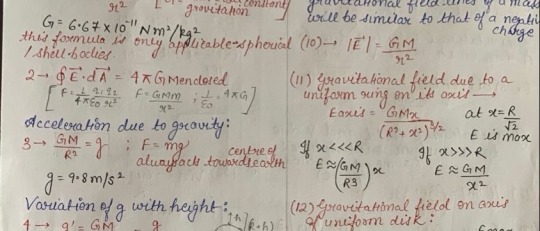

mostly free resources to help you learn the basics that i've gathered for myself so far that i think are cool
everyday
gcfglobal - about the internet, online safety and for kids, life skills like applying for jobs, career planning, resume writing, online learning, today's skills like 3d printing, photoshop, smartphone basics, microsoft office apps, and mac friendly. they have core skills like reading, math, science, language learning - some topics are sparse so hopefully they keep adding things on. great site to start off on learning.
handsonbanking - learn about finances. after highschool, credit, banking, investing, money management, debt, goal setting, loans, cars, small businesses, military, insurance, retirement, etc.
bbc - learning for all ages. primary to adult. arts, history, science, math, reading, english, french, all the way to functional and vocational skills for adults as well, great site!
education.ket - workplace essential skills
general education
mathsgenie - GCSE revision, grade 1-9, math stages 1-14, provides more resources! completely free.
khan academy - pre-k to college, life skills, test prep (sats, mcat, etc), get ready courses, AP, partner courses like NASA, etc. so much more!
aleks - k-12 + higher ed learning program. adapts to each student.
biology4kids - learn biology
cosmos4kids - learn astronomy basics
chem4kids - learn chemistry
physics4kids - learn physics
numbernut - math basics (arithmetic, fractions and decimals, roots and exponents, prealgebra)
education.ket - primary to adult. includes highschool equivalent test prep, the core skills. they have a free resource library and they sell workbooks. they have one on work-life essentials (high demand career sectors + soft skills)
youtube channels
the organic chemistry tutor
khanacademy
crashcourse
tabletclassmath
2minmaths
kevinmathscience
professor leonard
greenemath
mathantics
3blue1brown
literacy
readworks - reading comprehension, build background knowledge, grow your vocabulary, strengthen strategic reading
chompchomp - grammar knowledge
tutors
not the "free resource" part of this post but sometimes we forget we can be tutored especially as an adult. just because we don't have formal education does not mean we can't get 1:1 teaching! please do you research and don't be afraid to try out different tutors. and remember you're not dumb just because someone's teaching style doesn't match up with your learning style.
cambridge coaching - medical school, mba and business, law school, graduate, college academics, high school and college process, middle school and high school admissions
preply - language tutoring. affordable!
revolutionprep - math, science, english, history, computer science (ap, html/css, java, python c++), foreign languages (german, korean, french, italian, spanish, japanese, chinese, esl)
varsity tutors - k-5 subjects, ap, test prep, languages, math, science & engineering, coding, homeschool, college essays, essay editing, etc
chegg - biology, business, engineering/computer science, math, homework help, textbook support, rent and buying books
learn to be - k-12 subjects
for languages
lingq - app. created by steve kaufmann, a polygot (fluent in 20+ languages) an amazing language learning platform that compiles content in 20+ languages like podcasts, graded readers, story times, vlogs, radio, books, the feature to put in your own books! immersion, comprehensible input.
flexiclasses - option to study abroad, resources to learn, mandarin, cantonese, japanese, vietnamese, korean, italian, russian, taiwanese hokkien, shanghainese.
fluentin3months - bootcamp, consultation available, languages: spanish, french, korean, german, chinese, japanese, russian, italian.
fluenz - spanish immersion both online and in person - intensive.
pimsleur - not tutoring** online learning using apps and their method. up to 50 languages, free trial available.
incase time has passed since i last posted this, check on the original post (not the reblogs) to see if i updated link or added new resources. i think i want to add laguage resources at some point too but until then, happy learning!!
#study#education resources#resources#learning#language learning#math#english languages#languages#japanese#mandarin#arabic#italian#computer science#wed design#coding#codeblr#fluency#online learning#learn#digital learning#education#studyinspo#study resources#educate yourselves#self improvement#mathematics#mathblr#resource
277 notes
·
View notes
Text
Pose Reference Resources
I promised Dia (aka aerequets) that I will make a collection of pose references in the reply of one of her art posts, and then I completely forgot about it. Until now. I'm sorry for my bad memory.
So, yeah, better late than never I guess?
The pose collection I use the most is no longer free. They used to let you download a whole album (more than 8GB worth of data) to use offline, but now you have to pay $40/package or $200 for full sets. I still have the zip file for a very old version of theirs, but I can't legally share it. So, let's skip to the other options.
1/ First, you heard of those 3D dolls program that let you model your own reference pose? This one is an online one and for free, the whole ordeal. Of course since it's online and free, you can't save your model for next time, and it costs quite a lot of time to set the model up. So, you should take as much screenshots in as many tricky angles as you need once you done with the setting. Best using for complicated scenes where those below don't have what you need already available.
2/ This one is free and in 3D, you can rotate the model to any angle that you need. The only set back is the numbers of poses are quite limited. This one is best for using as a basic blocks then build up what you want to draw, or just as a practice to improve your understanding of human anatomy.
3/ This one is free for personal uses and the pose collection is massive. The setbacks are the language barrier (it's in Japanese, English is sometimes tag-a-long) and you have to search through their pages for what you need. The pics for each pose is static but they are in different angle in almost 360 degrees. There are many 2-person and 3-person poses too. Great for illustration inspiration.
4/ This one will only show reference photos of human head, at whatever angle you rotate the model. The web interface is easy to use. There are options like searching based on gender, ages, emotions, glasses, facial hair or not, etc. Good for practicing face drawing.
5/ This one will show reference photos for human body parts, at whatever angle you rotate the model, read the instructions for how to do it. The web interface is quite hard to use at first, just tinkering around for a bit, and you will be fine. There are options like searching based on gender and which particular parts that you need refs for. Good for that moment when you go "huh? how is this <body part> will look in this <situation>????"
6/ This one will only show reference photos of animal heads, and only the head, at whatever angle you rotate the model. The accurate skull refencence list is their best point. There are enough common species in the drop down list. Tbh, I don't use this much because I often need refs for the whole animal most of the time. But it's best for furry artists, I guess?
7/ Real model photos. They sell pose reference in themed packs, but there are enough free packs to use as drawing practice too.
8/ This is the best for general background reference. Lots of options. Not really good for very specific location results, but good for random background in drawings.
9/ Lastly, for specific objects or background references at strange angles, I often search for 3D models on this site then take screenshots of whatever I need.
That's all, folks. Hope this list can help ease some of the struggles that we will encounter on our quest of learning the art of drawing things 😂
290 notes
·
View notes
Note
hi hiii i wanted to say that your account is so refreshing to see, esp with the passion you have for the arts. as someone who's been meaning to read (and write) more poetry, do you have any recommendations? some classics that everyone and their mothers know? perhaps some underrated pieces that changed you? or even just authors you like, I'm very open to suggestions :]]
Hi! Thank you so much for this kind ask :) So exciting that you’re looking to delve deeper into reading and writing! I had to take a little time to answer this because my thoughts were all over the place lol.
For a review of notable/classic poems/poets, I honestly just recommend looking at lists online or, hell, just binging Wikipedia pages for different countries’ poetry if that’s something you’re into, just to get a sense of the chronology. I read one of those little Oxford Very Short Introductions on American Poetry and thought it was pretty good, but online is quicker if you’re just searching for poets or movements to hone in on. Poetry Foundation also has lots of resources, in addition to all the poems in their database. I guess my one big classic recommendation would have to be Emily Dickinson (<3), but really the best move is just to find a poet you already enjoy and then look around to see who their peers were/are, who they were inspired by, who they’ve maybe translated here and there, etc. and follow it down the line as far as you can.
For some personal recs, here are some collections I’ve really enjoyed over the past two years or so. Bolded favorites, and linking where select poems from the book have been published online. But also, if you want a preview of a couple poems from another of the books to see if they interest you, DM me and I can send them over! You can also feel free to pilfer through my poetry tag for more stuff lol
Autobiography of Death by Kim Hyesoon trans. Don Mee Choi
Conflict Resolution for Holy Beings by Joy Harjo
DMZ Colony by Don Mee Choi
Hardly War by Don Mee Choi
Whereas by Layli Long Soldier
Geography III by Elizabeth Bishop
Dictee by Theresa Hak Kyung Cha
Don’t Let Me Be Lonely: An American Lyric by Claudia Rankine
Mouth: Eats Color—Sagawa Chika Translations, Anti-Translations, & Originals by Sawako Nakayasu
The Selected Poems of Osip Mandelstam trans. W.S. Merwin and Clarence Brown
The Branch Will Not Break by James Wright
This Journey by James Wright
God’s Silence by Franz Wright
Duino Elegies by Rainer Maria Rilke (the translation I read was by Alfred Corn—I thought it was great, but idk if there are better ones out there!)
DMZ Colony, Hardly War, Dictee, Don’t Let Me Be Lonely, and partially Whereas are all book-length poems with some prose poetry and varying levels of weirdness/denseness/multilingualism—if you were to pick one to start with, I’d say do Don’t Let Me Be Lonely or Whereas. Mouth: Eats Color is some experimental translations of Japanese modernist poet Chika Sagawa, with other translations and some of Nakayasu’s original stuff mixed in—it's definitely a bit disorienting but ultimately I remember having such fun with it, as much fun as Nakayasu probably had making it. It’s a book that emphasizes co-creation and a spirit of play, and completely changed my attitude towards translation.
If you’re less interested in that kind of formal fuckery stuff though (I get it), can’t go wrong with the other books! Conflict Resolution for Holy Beings is the one I read most recently, and it’s great—Harjo also featured in Round 1! Franz Wright also featured, and God's Silence is the collection which "Night Walk" comes from. James Wright (father of Franz) is one of my favorite poets of all time, though his poetry isn’t perfect. Even so, I’m honestly surprised he’s not doing numbers on Tumblr—Mary Oliver was a big fan of his, even wrote her "Three Poems for James Wright" after his death.
I mentioned in another post that one of my favorite poets is Paul Celan, so I’ll also recommend him here. I read Memory Rose into Threshold Speech which is a translated collection of his earlier poems, but it’s quite long if you’re just getting to know him as a poet—fortunately, both Poetry Foundation and Poets.org have a ton of his poems in their collections. There’s also an article by Ilya Kaminsky about him titled “Of Strangeness That Wakes Us” (!!!!!) that’s a great place to start, and is honestly kind of my whole mission statement when I’m reading and writing poetry. Looking at the books I’ve recommended above, a lot of them share feelings of separateness or alienation—from others, from oneself, from one’s country, from language—that breed strange, private modes of expression. That tends to be what I’m drawn to personally, and that’s some of what Kaminsky talks about.
Sorry of the length of this—I hope it's useful as a jumping-off point! And if you or anyone ends up exploring any of these poets, let me know what you think! If folks wanna reply with recommendations themselves too that'd be great :)
#ask#not a poll#i originally was going to link to previews of the books directly on this post but for some reason I suddenly feel very paranoid about#copyright LMAO. ik this blog is already like copyright infringement central but I feel like I can at least make an argument for the polls#being fair use lol. in the way that i could not for the pdf previews I made. (i also have a full pdf of hardly war if anyone wants lol)#and i know it's not entirely rational bc this is tumblr and nobody looks on tumblr. but i'm not used to having this many followers lol so i#admittedly just getting anxious about silly things#but please please feel free to DM me! or send an ask off anon#discussion
293 notes
·
View notes
Text



Updated* Current Goals/Habits I Wish To Achieve 🎀
I have added and removed some daily goals and habits from my first posted list, so I thought I’d post an updated list of my goals and habits!
Workout 20+ Minutes Daily
Daily walks OR 10,000 steps a day
Drink 100oz of water daily
Read 30+ min or 10+ pages daily
Skincare routine AM and PM
Journal AM and PM
Make bed every morning
Study a language 10+ minutes daily
Sleep 6 - 8 hours nightly
Practice a hobby 10+ minutes daily
The two languages I am currently focusing on studying are Spanish and Japanese, the two languages I love the most. Once I get more comfortable with Japanese, I do plan on picking up Korean, as that is my third favorite. I used to self study Japanese for two years and even took a university Japanese class but had to stop and haven’t picked it up. Spanish is useful for where I live and I also think it is a beautiful language, and I’ve taken university classes for Spanish but due to my personal situations at the time, I wasn’t successful in those classes. I do currently have my Japanese textbook from my previous class as well as two Spanish textbooks from my previous classes.
Some hobbies I am trying to get back into is drawing and reading, and I am looking into starting some other hobbies such as crochet, cooking, scrapbooking/bullet journaling, painting, photography, learning sign language, and as I mentioned, language learning,
If anyone has any language learning (self study) tips or resources, tips and resources for any of the mentioned hobbies, or any general motivation or encouragement you want to share, please feel free! It would be greatly appreciated!
I know realistically I will not accomplish everything I listed every single day but the goal ultimately is to make an honest effort and keep my priorities in line with my daily actions. I am going to consistently work on myself and guide my daily routines towards progress and productivity while still giving myself the rest and recovery I need.
Thank you all!
Til next time, lovelies! 🩷🤍
#pink pilates girl#pink pilates princess#self care#self development#self love#wonyoungism#health & fitness#mental health#it girl#physical health#study tumblr#student life#college studyblr#studyblr#pink academia#pink blog#self care tips#kpop#wonyoung#girlblogging#girl blogging#dream girl#vanilla girl#clean girl#it girl energy#that girl#green juice girl#language learning#pink moodboard#pink aesthetic
291 notes
·
View notes
Text
With the current promotion on Bookwalker Japan you can again read some first volumes of well-known manga series for free. If you are interested in getting a taste of reading manga in Japanese without committing to a purchase right away, I can really recommend it. You don't need to create an account - all you have to do is click on the red button with 無料で読む and get started. Just note that these offers all expire at the end of January!
暗殺教室. Assassination classroom. Read the first 3 volumes for free: https://bookwalker.jp/de1ae0ece7-a723-4183-a3c8-42209f36b107/
ゴールデンカムイ. Golden Kamuy. Read the first 10 volumes for free: https://bookwalker.jp/de6ecf59e4-aedd-49a0-85af-e8c2821c0ccd/
斉木楠雄のΨ難. The Disastrous Life of Saiki K. Read the first 3 volumes for free: https://bookwalker.jp/debf655d7f-320d-4273-a0e1-acc570192a72/
古見さんは、コミュ症です。Komi Can't Communicate. Read the first 5 volumes for free: https://bookwalker.jp/de77cc1af7-42e0-4f41-80a1-e662093d0084/
葬送のフリーレン. Frieren. Read the first 2 volumes for free: https://bookwalker.jp/dedbb6f380-b665-45c4-8e5c-f4a191fa2a75/
#reading in japanese#study japanese#learning japanese#日本語#japanese books#maga in japanese#free japanese manga#free japanese reading resources#bookwalker
167 notes
·
View notes
Text
Self / Independent Learner's Guide to Language Learning From Zero
-a mini study plan
I used this for Spanish, French and Italian, it is my favourite way of starting to learn. It won't teach you the langauge but if this is your first time, if you feel confused and don't know where to begin, this is for you!
-this is kinda romance langauge based but might give you ideas if you are learning from a different family too
-this is very notebook / writing based since i prefer learning that way
Step 1: Preperation
First of all, ask yourself "do i already have some amount of immersion in this langauge?" As humans, we learn from immersion a lot. Songs, but especially visual media is incredibly heplful. I never studied japanese but after watching a few animes i picked up 5-10 random words. Passive vocabulary, being familiar to most common words will be your biggest friend. If the answer is no, before start studying ANYTHING do some immersion.
e.g. I watched dix pour cent for French and learned arrêt which means stop because characters were shouting to each other all the time.
After making sure you have some immersion or if you already have some, PREPARE YOUR RESOURCES. Make a file in your computer, reblog tumblr posts, save links. Search for pdfs in google. (x language a1 pdf / x langauge a1 grammar book / x language a1 reading) Free PDF's and and useful websites. The more the merrier. Why? Because when you actually start learning you will slowly realise them half of them are not actually useful, too advance, too simple, not in your preffered style etc. You will en up using same handful amount of resources again and again but before that, you have to TRY EVERYTHING. You are unique and so will be your learning process.
Google x language A1 curriculum. (you can try adding "pdf" at the end of sentence as well) It "probably/ hopefully" exists. If you can't find that way, learn which offical exam is necessary (e.g. for French it's DELF/DALF, in english there is IELTS and so many more) If you are lucky, you can find a langauge teaching enstitute's curriculum and you can find in what order they teach things. This was very helpful for me because sometimes you don't know what to study next, or just want to visualise what do you need to learn, it is helpful. I printed one out and paste it to the back cover of my notebook. You won't need this one YET. I'll explain in a second. Keep reading.
Get a notebook. I don't prefer books while learning from zero because it will be filled with vocabulary you don't know. My pereference is no squares no lines empty ass notebook and colorful pens. I'm a person of shitty doodles. I love to draw and visualise things. It really helps my brain. In A1, your knowledge is absouletly zero and your brain is about the explode with realising GREAT MASS of knowledge you need to learn in order to be "fluent" . So keep things away from being "too much" if you want to avoid a burnout.
Set a timer. If you want to avoid burnout, the secret is always quit when you feel like you can go another round happily. Quit when you are dopamine high. If you study too much, next day you'll wake up tired, want to rest etc. and make it harder for you to create a habit. I did this mistake with French by studying 4-5 hours everyday for around 30 days. I completed my challenge, completly quit and then didn't come back for MONTHS.
You will be re-studying A LOT. Language learning is repetition. You will start by studying "the A1 curriculum". But, because this is your first time your focus will be on the vocabulary and general comprehension. You are trying to re-wire your brain, and learn a different way of thinking and living. It's not easy. It will take time. It will be painful at times. But it is 100% worth it.
After you finished studying your curriculum, you'll take a short break and then study the curriculum AGAIN. For a second time. Because you already know the basics, this time you will be able to focus more on the little things you weren't able to comprehend the last time. e.g. articles or whatever little frustaring thing your langauge has. Also focus more on basic prononciation and especially reading aloud. Find a realistic text-to-reader. Copy-paste a text. Listen and repeat.
Get a new Youtube and Instagram account dedicated to langauge study. How many good resources exists and where they are is really depens on which langauge you are learning. For english, youtube is better. For French, instagram is better. You have to see for yourself. If you get a seperate account for your langauge algorith will learn faster and you won't be distracted by other stuff. Short form engaging videos are the best for absolute beginners. Re-watch things and try to repeat them out loud. It's called shadowing and is your future best friend.
If you want to learn how to speak, you first need to how to write. If you can't write sentences without looking at google translate (or reverso) you won't be able to make up sentences in your head. If you want to learn how to write, your first need to learn how to read. You need to start in this order but also don't be perfectionist. Do it even if you do it wrong. They will be fixed eventually and won't stick. Record yourself speaking even if the text you are reading is 90% google translated. Why? Beacuse speaking will enhance your vocabulary in a way no other thing can and that's the core of reading. So this isn't a linear thing. It's actually a circle!
Step Two!
Ok, Sadie, i got my notebooks and read through all the warnings where do i start?
*First page:
[] means written is target langauge
[x notebook] x= your target langauge
Add something cute and make you feel happy to open up the notebook. It can a drawing, a picture, anything. First page is your entrance to your new home. Make it welcoming.
*[My name is X. I am Y years old. I live in Z.]
*Greetings. Main articles if there are any. Yes, no, please, thank you.
*What is your name, what do you do for living, how are you, where are you from, how old are you, how many langauges do you speak, numbers from 0-100. If there are multiple way of saying these things and probably there are, just write one. You will eventually learn others. Baby steps.
*write a basic ass text of two people having a conversation asking and answering these questions.
*the alphabet and how to pronounce the letters. basic letter combinations that change into a different sound. a youtube video about this 100% exists.
*personal pronouns and if there is a "am/is/are" verb the conjugation of it. (in spanish there is two unfortunately)
*artciles and basic noun endings. a couple exemples of nouns in x form but takes y article.
*first 5 most common verbs. learn the conjugation, try writing basic ass sentences. (e.g. to come, go, have, speak)
*three more verbs (e.g. to eat, can, to want)
*take some time to fully comprehend. check your curriculum list to look and see if you want to add anything. e.g.for spanish that can be ser vs estar, for spanish is can be "how to ask questions in french" becaue it's way harder compared to other langauges.
*take some break from grammar and learn some vocab maybe. it can be colors, or feelings. (i am sad, i am hungry etc.)
*start studying most common verbs. usually a form of categorization exists. usually it's verb ending. (unless it's a language like turkish where every verb either ends with -mek or -mak lol.) Start with 10- 15 most common verbs. You will also be learning some vocabulary by default. (try to stick to regular verbs if you can, if not that's fine)
(Do not learn any verbs you won't be able to use immediately.)
*Learn basic adjectives and how they work so you can form more detailed sentences.
*After comprehending how to form basic positive negative sentences and some verbs, congratulate yourself, because you deserve it!
*Learn how tell time. "What time is it? It's x'o clock."
*learn clothing and how to simply describe physical look e.g. hair color, eye color, beard, glasses...
*learn the verbs of daily routine. be able to write a generic ass "i wake up, i do breakfast, i eat lunch at school, i sleep" sort of text.
*demonstratives. this that. these. those. you can add some vocabulary you like. this is a cat. this is a tree. you can add placement adjectives now or later. (the cat is under the sofa. the bird is on the table etc.)
*Now you know a lot of things! Take some time and focus a bit more on the vocab, let your brain process things, do some passive immersion. avoid a burnout at all costs.
*learn how to say "there is" (if you want more vocab transportation and city centre themes can be included.)
*learn how to talk about your hobbies.
This is the generic A1 curriuculum. You are able to understand basic things, you have a generic comprehension. That's all it takes to be considered A1. If you want to pass it though, what you need is a good grammar source. For French and Spanish Kwiziq was very useful. I couldn't find a good online grammar resource for Italian yet. (please ask more experienced langblrs for recs.) Slowly learn more vocab (since A1 is more vocab based. If you hate Anki and Quizlet stuff check Linguno. Actually check Linguno anyway it's a banger and i'm gonna die on that hill.)
If you don't have have native friend to ask questiones and you don't have any ethical concerns ChatGPT can be useful. I'm using it for French for months. Why are we using this particle here, why this and not that, can you give me some example sentences.... you can play guess the animal, ask for writing prompts and then make ChatGpt find and explain your mistakes to you. It's very handy.
*Don't be scared to share about your journey on Tumblr and most importantly ENJOY!
309 notes
·
View notes
Text
Really basic study tips. As in, you have no idea where to start, or you've been floundering for X period of time not making progress.
Total beginner?
Go to a search engine site. Whatever one you want Google.com, duckduckgo.com, or a searx.space site will work (I like search.hbubli.cc a lot). I think a non-google search engine will give you less ads and more specific results though so keep that in mind.
As a total beginner, search for some articles and advice to help you start planning HOW you are going to study a language. Search things like "how to learn X" where X is the language, "how i learned X," "guide to learn X." Ignore the product endorsement pages as best you can, you're looking for personal blogs and posts on learner forums like chinese-forums.com and forum.language-learners.org. After reading a few of these, come up with a list of general things you need to learn. This list will generally be: to read, to listen, to write, to speak. The articles/advice you find will likely mention Specific Study Activities people did to learn each of those skills - write them down! You might not do all those study activities yourself. But its good to know what possible study activities will help build each of the 4 skills.
Now get more specific. Think about your long term goals for this language. Be as SPECIFIC as possible. Things like "I want to pass the B2 exam in French" (and knowing what CEFR levels are), or "I want to watch History 3 Trapped in chinese with chinese subtitles" or "I want to read Mo Dao Zu Shi in chinese" or "I want to play Final Fantasy 16 in japanese" or "I want to make friends with spanish speakers and be able to talk about my hobbies in depth, and understand their comments on that subject and be able to ask what they mean if I get confused." Truly be as specific as possible. Ideally make more than one long term goal like this. And then specify EVEN MORE. So you want to "pass the B2 exam in French" - why? What real world application will you use those skills for. A possible answer: to work in a French office job in engineering. Great! Now you know very specifically what to look up for what you Need to actually study: you need to look up business appropriate writing examples, grammar for emails, engineering technical vocabulary, IN addition to everything required on the B2 exam. Your goal is to read mdzs in chinese? Lets get more specific: how many unique words are in mdzs (maybe you want to study ALL of them), how much do you wish to understand? 100% or is just understanding the main idea, or main idea and some details, good enough? Do you want to learn by Doing (reading and looking up things you don't know) or by studying ahead of time first (like studying vocabulary lists). Im getting into the weeds.
My point is: once you have a Very Specific Long Term Goal you can look up how to study to accomplish that very specific goal. If you want to get a B2 certificate there's courses and textbooks and classes and free materials that match 100% the material on the B2 test, so you can prioritize studying those materials. If your goal is to READ novels, you'll likely be looking for "how to read X" advice articles and then studying based on that advice (which is often "learn a few thousand frequent words, study a grammar resource, use graded reader material at your reading level, extensively and intensively read, look up unknown words either constantly or occasionally as desired when reading new material, and continue picking more difficult material with new unknown words"). Whatever your specific goal, you will go to a search engine and look up how people have accomplished THAT specific goal. Those study activities they did will be things you can do that you know worked for someone. If you get lucky, someone might suggest ALL the resources and study activities you need to accomplish your specific goal. Or they will know of a textbook/course/site that provides everything you need so you can just go do it. I'll use a reading goal example because its a specific goal i've had. I'd have the goal "read X book in chinese" so I'd look up "how to read chinese" "how to learn to read chinese novels" "how i read chinese webnovels" and similar search terms. I found suggestions like these on articles I found written by people who managed to learn to read chinese webnovels: Ben Whatley's strategy had been learn 2000 common words on memrise (he made a deck and shared it), read a characters guide (he linked the article he read), use graded readers (he linked Mandarin Companion), use Pleco app and read inside it (he linked Pleco) and in 6 months he was reading novels using Pleco for unknown words. I copied most of what he did, and did some of my own other study activities for theother 3 listening speaking writing skills. And in 6 months I was also reading webnovels in Pleco. Another article was by Readibu app creator, who read webnovels in chinese just looking up TONS of words till they learned (real brute force method). But it worked! They learned. So copying them by using Readibu app ans brute force reading MANY novels would work. Another good article is on HeavenlyPath.notion.site, they have articles on specifically what materials to study to learn to read - their article suggestions are similar to the process I went through in studying and Im confident if you follow their advice you'll be reading chinese in 1 year or less. (I saw one person who was reading webnovels within 3 months of following the Heavenly Path's guide plan). LOOK UP your specific long term goal, and write down specific activities people did to learn how to do that long term goal. Ideally: you will have some
SHORT TERM GOALS: you will not accomplish your long term language goal for 1 year or more. Probably not for many years. So make some short and medium term goals to guide you through studying and keep you on track. These can be any goals you want, that are stepping stones to the specific long term goals you set. So for the "read mdzs in chinese" long term goal, short and medium term goals might be the following: short term: learn 10 common words a week (through SRS like anki or a vocabulary list), study 100 common hanzi this month (using a book reference or SRS or a site), read 1 chapter of a grammar guide a week (a site or textbook or reference book), medium term: read a graded reader with 100 unique words once I have studied 300 words (like Mandarin Companion books or Pleco graded readers for sale), read a 500 unique word graded reader once I have studied 600 words, read 秃秃大王 and look up words I don't know once I have studied 1500 words (read in Pleco or Readibu or using any click-translator tool or translator/dictionary app), read another chinese novel with 1500 unique words, read a 30,000 word chinese 2 hours a day until I finish it, read another 30,000 word novel and see if I can finish it in less time, read a 60,000 word novel, read a 120,000 word novel, read a novel extensively without looking any words up and practice reading skills of relying on context clues (pick a novel with lower unique word count), read a novel a little above your reading level (a 2000 unique word count if say you only know 1700 words), go to a reading difficulty list and pick some novels easier than mdzs to read but harder than novels you've already read (Readibu ranks novels by HSK level, Heavenly Path ranks novel difficulty, if you search online you'll find other reading difficulty lists and sites). Those shorter term goals will give you things to work for this week, this month, this year. An example of study goals and activities might be: study all vocabulary, hanzi, grammar in 1 textbook chapter a week (lets say 20 new words/10-20 new hanzi,1-5 new grammar points - or alternatively you have 3 SRS anki decks for vocab, hanzi, grammar) along with read and look up unknown key words for 30 minutes a day (at first you may read graded readers then move onto novels). Those are short term goals you can ensure you meet weekly, and they also contribute to being able to read better gradually each month until you hit long term goals.
If you are very bad at making your own schedule and study plans: look for a good premade study material and just follow it. A good study material will: teach reading, writing, speaking, and listening skills, all the way to intermediate level. You may need to find multiple premade resources, such as 1 resource for writing/reading (many textbooks that teach 2000+ words and basic grammar will suffice) and 1 for speaking/listening (perhaps a good podcast, glossika, a tutor). Ideally formal classes will teach all 4 skills to intermediate level if you take 4 semesters of classes as an adult (beginner 1, beginner 2, intermediate 1, intermediate 2). Especially if the classes teach in accordance with trying to match you to expected defined language level skills (so formal classes that have syllabus goals that align with HSK, CEFR, or national standards of X level of fluency). So formal classes are an option. The same tips as above apply: make short term goals do do X a week, like study 30 minutes to 2 hours a day, to learn 10 new words a week, to get through X chapters a month, to practice speaking/reading/writing/reading oriented activities to some degree.
My short advice for picking a premade resource if totally lost: pick a starting material that covers 2000 words, basic grammar, and has dialogues if you don't know where to start. That will be enough to cover roughly beginner level language skills. I suggest you study by: studying the vocabulary and grammar of each chapter, listen to the dialogue with and without translation repeatedly until you understand it (listening skills), read the dialogue with and without translation (reading skills), write out example sentences using the new vocabulary and grammar (writing skills, the textbook exercises usually ask you to do this), speak your example sentences out loud (speaking practice), record yourself saying the dialogue and compare it to the dialogue audio - repeat this exercise until you sound similar in pronunciation to dialogue (speaking exercise - shadowing). Most decent textbooks will allow you to come up with similar activities to those listed above, to study some writing reading speaking listening. I like the Teach Yourself books as an example of the most basic version of what you need. Many languages have much better specific textbooks of that language. But if you're totally lost, get a Teach Yourself book and audio free from a library or for 10 dollars (or ANY equivalent book that teaches at least 2000 words and grammar) and go through it. If you buy a language specific textbook: keep working through the series until you've learned 2000 words and covered all basic grammar. For example Genk 1 and 2 cover 1700 words so you would want to work all the way through Genki 2 and ger near 2000 words before branching off to a textbook for intermediate students, or into native speaker materials. (Another example is I found a chinese textbook once that only taught 200 words... as a beginner you would not find that book as useful as one with more vocabulary)
Another adequate premade resource option: if you lile SRS tools like anki, look up premade decks that teach what you need to learn as a beginner. For Japanese you might look up "common words japanese anki deck" (Japanese core deck with 2k or more words is likely an option you'll see), "japanese grammar anki deck" (Tae Kin grammar deck is an option that covers common grammar), "JLPT kanji deck" or "kanji anki deck" or "kanji with mnemonics anki deck" (to study kanji). Ideally you study vocabulary, vocabulary, kanji, and ideally some of these anki decks will have audio and sentence examples for reading practice. Like with a textbook, you would attempt to do exercises which cover reading writing speaking listening. For reading and writing you may read sentences on anki cards, and write or type example sentences in a journal with new words you study and new grammar points. For listening you will play the sentence audio of a card with eyes closed until you hear the words clearly and recognize them, and for speaking you'll speak out the sentences and compare what you say to the audio on the card.
Keep in mind your specific long term goals! If your goal is speak to friend about hobby, you may follow a textbook and still need to ALSO make yourself practice talking weekly (on a language exchange app, with a tutor, with yourself, shadowing dialogues, looking up specific words you wish to discuss). If your goal is to read novels, you will likely need to seek out graded readers OUTSIDE your textbook and practice reading gradually harder material weekly. If your goal is listening to audio dramas, you will want an outside podcast resource likely starting with a Learner Podcast (chinese101, slow chinese, comprehensible chinese youtube channel) then move into graded reader audiobooks, then listen to audio dramas with transcripts, then just listen and look words up.
Once you hit lower intermediate: I'm defining that here as roughly you have studied 2000+ words, are familiar with basic grammar and comfortable looking up more specialized grammar information, and if you used a premade material then you have finished the beginner level material. If you desire to stay on a premade route then pick new resources made for intermediate learners. Do not dwell in the beginner material forever once you've studied it, continue to challenge yourself and learn new things regularly. (No matter what, continue to learn new things regularly, if you do that then every few hundred hours of study you WILL make significant progress toward your goals). Once you have hit intermediate it is also time to start adding activities that work toward your Very Specific Long Term goals now if you didn't already start. If you want to watch shows one day, this is when you start TRYING and get an idea of how much you understand versus how much you need to learn and WHAT you need to learn to do your goal well. If you want to read novels then start graded readers NOW if you havent already and progress to more difficult reading eventually into reading novels for native speakers. If you want to talk to people, start chatting regularly. If you want to take a B2 test, start studying language test specific study materials, practice doing the tasks you must be able to do to pass the test (so you can see what you need to learn and gauge progress over time), take practice tests. Intermediate level is when SOME stuff for native speakers will be at least understandable enough you can follow the main idea. Or at least, if you look up some key words you'll be able to grasp the main idea. Start engaging with stuff in the language now. For several reasons. 1. You need to practice Understanding all the basics you studied. Just because you studied it doesnt mean you can understand it immediately yet, you have to practice being in situations that require you to understand what you studied. 2. You also need to gauge where you are versus where you want to be, in order to set new short term goals. Once you do things in the language, you will see what specifically you need to study more. 3. By doing the activity you wish to do, you will get better at doing it. This is also a good time to mention that: if you wish to get better at speaking or writing now is the time to practice more. Just like listening and reading, you'll have to Do it more to improve.
The leap from using materials for beginners to materials for intermediate learners is harsh. It just is. The first 3 to 6 months you may feel drained, like you didn't learn much after all, annoyed its so much harder than the beginner material catered usually specifically to a learner's language level. Push through. I suggest goals like "listen to french 30 minutes a day" or "read 1 japanese news article a day" or "chat with someone for 1 hour total a week" or "watch 20 minutes of a show a day" or "write 1 page a day" and look up words you dont know but need to understand something or communicate to someone. Do X for X time period or X length of a chapter/episode type goals may be easiest to stick to during this period. Gradually, the time spent doing activities will add up and it will suddenly feel EASIER. Usually around the time you start understanding quicker and recalling quicker what you studied as a beginner. Then it keeps improving, as you gradually learn more and more. At first, picking the easiest content for your study activity will make the transition to intermediate stuff slightly less drastic. Easier content includes: conversations on daily life that only gradually add more specific topics (so you can lean on the beginner daily life function vocabulary), podcasts for learners entirely in target language and podcasts with transcripts, novels with low unique word counts (ideally 2000 unique words or less until your vocabulary gets bigger), shows you've watched before in a language you know (so you can guess more unknown words and follow the plot even when you don't understand the target language words), video game lets plays (ideally with captions) of video games you've played before, playing video games you already have played before and know the story for, reading summaries before starting new shows or books so you know what the general story is, reading books that have translations to a language you know (so you can read the translation then original or vice versa for additional context). Using any tools available (dictionary apps, translation apps like Pleco and Google Translate and click-translate web browser tools, Edge Read Aloud tool, reader apps like Kindle and Readibu, apps like Netflix dual subitles stuff).
Last mention: check in with your goals every so often. You might check in every 3 months, and say you notice you never manage to study daily (if that was your short term goal). That could be a sign it might be better to change your study schedule to study a couple hours on the days your life schedule is less busy, and skip study on busy days. Or it may be a sign the study activity you're trying to do daily is Very Hard for you to stick to, and maybe you should switch to a different study activity. (Example would be: I can't do SRS flashcards consistently, so when I got tired of SRS anki after a few months as a beginner, I switched to reading graded readers daily to learn new vocabulary then reading novels and looking up words. Another example: I love Listening Reading Method but could never do it as it was designed, so after a month of only doing 15 hours of it instead of the 100 hours the method intended at minimum in that time, I decided to modify that study activity into something I could get myself to do daily and enjoy more).
And, of course, its okay if what works for one person doesn't work for you. Everyone's different. As long as you are regularly studying some new things, and practicing understanding things you've studied before, you will make progress as the study hours add up. It may take hundreds of hours to see significant progress, but you Will see some progress every few hundreds of hours of study. I made the quick start suggestions for beginners above, because I have seen some people (including me) get lost at the start with no idea what a good resource looks like and no idea what to study, or how to determine goals and progress on those goals.
#rant#reference#resources#study plan#langblr#i could also make a side post lol on just HOW many language learning apps/tools are distractions for beginners#because they barely teach like 300 words! but readers spend YEARS on them!#u can cover 2000 words in 1 year. even high school classes cover that in 2 years. but many an app have u spending 4 years on 2000 words#then u get beginners mad they never Learned to do stuff in the language despite All Tgat Study#not realizing the apps problem was it simply ONLY covered beginner material. so it was only gonna be useful for 6 months to 2 years tops.
80 notes
·
View notes
Note
What are those apps you usually post in your productivity updates?
hi! here's a breakdown of apps i use, as well as websites and other resources i've used/use for my learning (mainly chinese, though some of these resources can be used for other languages as well).
apps i use every day:
dot languages: this is a chinese-specific app where you select your hsk level, and then read articles at that level. there's a pop-up dictionary, an option to show pinyin, post-article vocab practice (audio, matching, translation, and writing), and the option to have your articles either in simplified or traditional.
TOFU learn: a blend between flashcards and writing, you can find decks for various things, including hsk level-specific decks, and you learn new vocab with the stroke order and then write each new term three times—once with an overlay (so the term is visible), and then two times from memory. there's also a review function, which helps you practice terms you've already learnt, and each term has audio that goes with it. i use it for chinese, but there's decks for esperanto, french, german, italian, japanese, korean, norweigian, portuguese, russian, spanish, swedish, and turkish.
the pleco dictionary app: my favourite chinese dictionary app; allows you to translate from english to chinese or chinese to english, has options for writing, radical, vocal, and keyboard entry, and has both traditional and simplified characters.
ankiapp: this one's not particularly complicated; it's a flashcard app, where you can make your own decks or download decks other people have made. it uses a spaced repetition system to help you remember terms—you rate yourself from worst to best on how well you remembered the term, and that determines how many times it'll pop up afterwards. it also gives you an overall grade for each deck, which is a nice way to measure your progress.
duolingo: probably my least favourite of all of the apps i use; the chinese course isn't the best, and now that they've removed the notes/grammar information option, there's no way for people who aren't already fairly familiar with the language and its inner workings to learn them if they exclusively use duolingo. it's okay for maintenance practice, though, but i'm already almost finished with the entire course and i would say it barely reaches to lower hsk 4, so i wouldn't say it's a good tool if you're more advanced.
apps i have but use less often:
readibu: this is sort of like dot in that it's an app for reading in chinese with a pop-up dictionary. however, that's where the similarities end; readibu has novels, short stories, and articles aimed at children, and each of those are further split into genres. readibu also lets you add your own web-pages and read them on the app, so you can use its pop-up dictionary with them. it's aimed more to intermediate and upper intermediate learners, with hsk levels ranging from hsk 4 to hsk 6. the only reason i rate dot above readibu is because dot has a larger range of levels (hsk 1 through hsk 6 i believe? but it may go higher) and exercises built in to help you learn the vocab.
the chairman's bao: also a chinese reading app, though if you use the free version, you only get one sample article per hsk level (hsk 1 - hsk 6). i believe that every so often you get a new sample article for each level, but i'm not sure what the interval on that is. it also has a pop-up dictionary and a flashcard option for saved vocab.
du chinese: another chinese reading app; it has articles divided into newbie through master (six levels in total, though they don't line up perfectly with the hsk in my experience), and new articles are free for a certain period of time before becoming locked behind a paywall. there's a pop-up dictionary and a vocab review/test option for vocab you save.
memrise: flashcards with audio, depending on whether you're using an official course or a user-generated deck. decent, but it can get repetitive.
hellotalk: not exclusively chinese, but i believe it started off mainly aimed that way. you set your language, and then your target language, and then you can talk to native speakers who have your language as their target language. potentially incredibly useful, but if you're like me and extremely introverted you may have a hard time using this app, since it requires a lot of one-on-one interaction.
slowly: i haven't actually gotten around to using this, but it's sort of like a digital penpal app, as i understand it. you can learn more about it here.
websites and other miscellanea:
this massive mega drive by @salvadorbonaparte (languages, linguistics, translation studies, and more).
this masterpost by @loveletter2you (linguistics, languages, and language learning books/textbooks).
this masterpost on chinese minority literature by @zaobitouguang
the integrated chinese textbooks by cheng and tsui, which are the textbooks i use for self-study—there's textbooks and workbooks, as well as character workbooks (though these can easily be cut out without suffering from the loss).
mandarinbean: graded readers, hsk 1 - hsk 6, with a pop-up dictionary and the option to read in traditional or simplified
chinese reading practice: reading, beginner through advanced (three levels), with a pop-up dictionary and some additional notes included on vocab and language-specific things non-native speakers might struggle with or not know.
hsk reading: graded readers, hsk 1 - hsk 6, divided into three sections (beginner, intermediate, advanced). does not have a pop-up dictionary, but does have an option to translate the text, post-reading quizzes, and notes on important vocab with example sentences.
my chinese reading: reading from beginner to advanced (four levels); has a pop-up dictionary, the option to play an audio recording of the passage you're reading, notes on key words, things that are difficult to translate, grammar, and post-reading comprehension questions.
the heavenly path notion website, which i would say is one of the best resources i've ever found, with a massive number of guides, lists of chinese media in a variety of forms, and general resources.
chinese character stroke order dictionary: what it says on the tin; will show you the stroke order for a given character.
hanzigrids: allows you to generate your own character worksheets. i use this very frequently, and can recommend it. the only downside is if you want to create multiple pages at once, you have to pay; however this can easily be circumnavigated by creating only one sheet at a time. you can download the sheet as a pdf and print it out for personal use.
21st century chinese poety: a resource i only came across recently; has a massive collection of contemporary chinese poetry, including translations; much more approachable than classical poetry, which can often be incredibly dense and hard to parse due to the writing style.
zhongwen pop-up dictionary: if you're reading something in chinese on a website that doesn't have a pop-up dictionary, this is a must. i've never encountered any words that it doesn't have a translation for so far, including colloquialisms/slang. i use it to read webnovels, and it's been a fantastic tool. you can also save vocab by hitting the r key when you're hovering over a word/phrase, making it easy to go back and add terms to your flashcard deck(s).
chinese reading world: a website put together by the university of iowa; split into three levels (beginner, intermediate, and advanced), with thirty units per level, and ten modules per unit, as well as multiple proficiency tests per level. each module is split into three parts: a pre-reading vocab quiz, the reading with a number of comprehension questions based on it, and a post-vocab reading quiz. it also rates you in relation to someone with a native proficiency based on how quickly you read and answer the comprehension questions, and how many vocab questions you get right.
jiaoyu baike: an extensive chinese-to-chinese dictionary, put out by the taiwanese ministry of education. you can find an extensive write-up on it here, by @linghxr.
social media etc: see this post by @rongzhi.
qianpian: another chinese-to-chinese dictionary; @ruhua-langblr has a write-up on it here.
this writeup on zero to hero by @meichenxi; initially aimed at chinese learning, but now has expanded greatly.
music rec's: this masterpost by @linghxr.
tv/film: youtube is a great place to find chinese tv shows and films, and they often have english subtitles. if you can't find something on there, though, you can probably find it either on iqiyi or asianvote, which have both chinese and other asian shows and films (though you'll want an adblock if you're going to use the latter). i use these a lot to watch things, and have discovered a lot of media through these, and then novels through those when i went searching to see what they were adapted from.
polylogger: a website for logging the amount of time/type of language study you do. has a wide variety of languages, and the option to follow other people. still, it's a fairly basic site.
#chinese langblr#chinese language#chinese learning#langblr#chinese#mandarin#langblr resources#resources#汉语#indigostudies#inbox#indigo ink
286 notes
·
View notes
Text


about me
Hi, I'm toki (she/her)!
I've been studying Japanese for 10+ years (omg) and I've had this Japanese langblr since 2019. I learned Japanese formally starting in high school and although I've never taken the JLPT, I consider myself lower advanced level (N3/N2?) except when I'm not.
I post:
beginner to advanced level Japanese content
* kanji
* vocabulary
* grammar
* kanji kentei test
* kotowaza kentei test
* other content
photos of Japan (mine & others')
Japanese culture/fashion/art/illustrations
random personal thoughts
unrelated things
Please feel free to talk to me about Japanese (or not-Japanese) anytime! I will do my best to answer questions related to Japanese or point you to a resource that can help.
My Japanese goals:
be better at Japanese
teach my son Japanese (he is learning to talk)
improve my 敬語 (formal Japanese) all around
write more in Japanese and have my writing corrected
Personal stuff:
native English speaker
old enough to have a husband and a son (2020 pandemic baby)
full time working mama (adulting is hard)
my hobbies include raising my son and catering to the whims of my 3 cats
I like anime/manga/reading/movies/hiking/travel
I track #tokidokitokyo (and post original content under this tag) and I also track #looktoki
#japanese langblr#japanese studyblr#langblr#studyblr#langblr introduction#studyblr introduction#pinned post#my photo#tdtphoto
137 notes
·
View notes
Text
Pitch, Please Pt. 1 [new series alert]
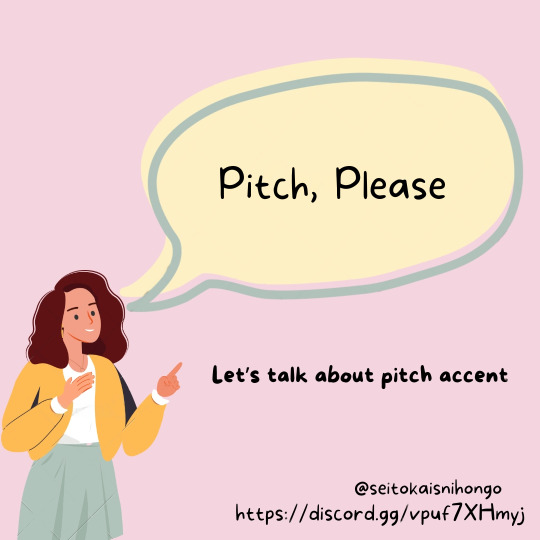
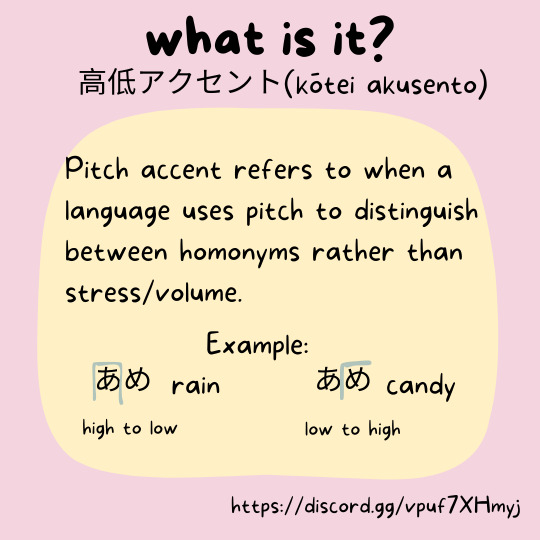
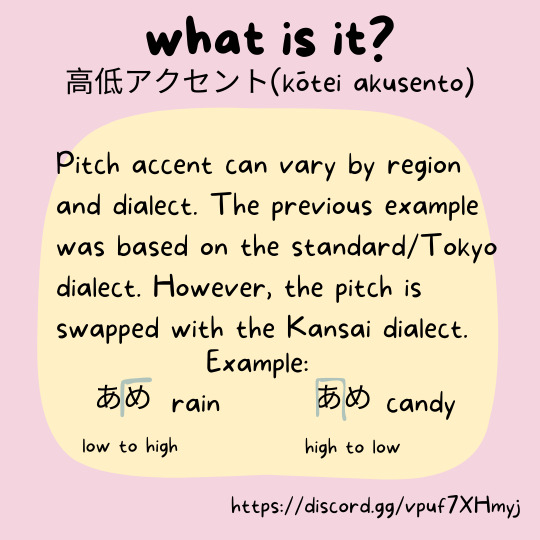
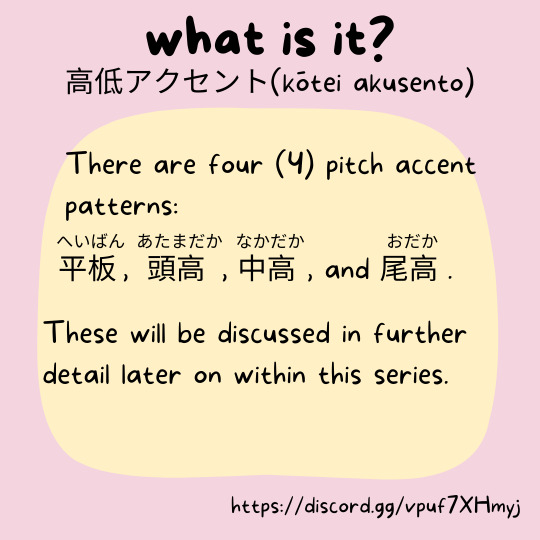

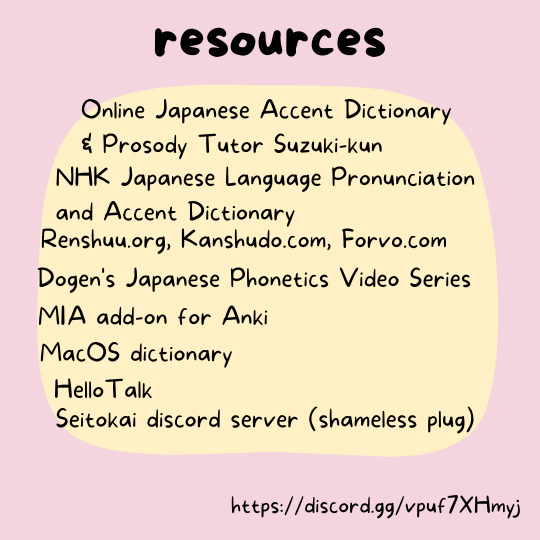
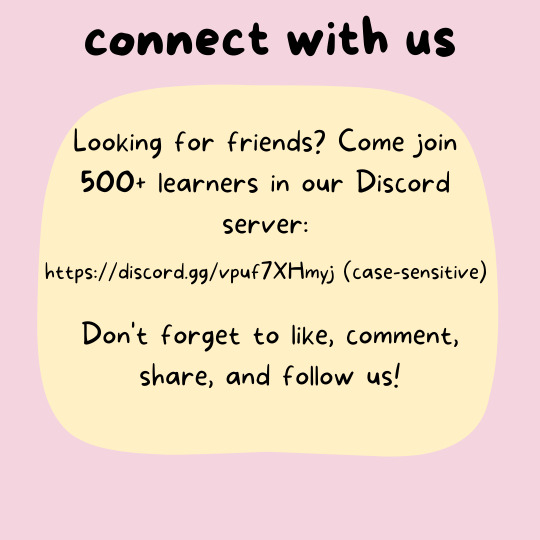
This was launched on the Seitokai IG (seitokaisnihongo). Keep reading this post to get information that is written on the graphics (and the IG caption).
This is a new series that I've been working on for a bit! It'll be discussing pitch accent, dialects, listening comprehension, and anything else that may fall within that category.
If there's a particular dialect that you'd like for us to cover in this series, feel free to stick it in the reblogs, my inbox, my asks, on the Seitokai instagram, or the Seitokai discord server!
Without further ado, here is what the posts say above!
Pitch, Please! Let's talk about pitch accent.
What is it?
Pitch accent, known as 高低アクセント(kōtei akusento) in Japanese, refers to when a language uses pitch to distinguish between homonyms rather than stress/volume. For example: あめ, meaning rain (high pitch to low) vs あめ, meaning candy (low pitch to high pitch).
Pitch accent can vary by region and dialect. The previous example was based on standard/Tokyo dialect. However, the pitch accent is swapped with the Kansai dialect. あめ, meaning rain goes from low pitch to high and あめ, meaning candy goes from high pitch to low.
There are four (4) pitch accent patterns: 平板 (へいばん), 頭高 (あたまだか), 中高 (なかだか), and 尾高 (おだか). These will be discussed in further detail in a later post within this series.
How to work on it?
Listen to native speakers (podcasts, news channels, videos, etc.)
Converse with native speakers (if possible)
Mimic the correct pronunciation
Be willing to ask for help and accept correction
Resources
Online Japanese Accent Dictionary & Prosody Tutor Suzuki-kun
NHK Japanese Language Pronunciation and Accent Dictionary
Renshuu.org, Kanshudo.com, Forvo.com
Dogen's Japanese Phonetics Video Series
MIA add-on for Anki
MacOS dictionary
HelloTalk
If you're looking for fellow learners, there are over 500 of us in the Seitokai discord server (shameless plug) and we'd love to have you!
#japanese#learn japanese#study japanese#pitch accent#japanese dialects#japanese grammar#kanji#vocab#jlpt#reading practice#listening comprehension#reading comprehension#shay's back with another post#pitch please#linguistics#seitokai#grammar
234 notes
·
View notes